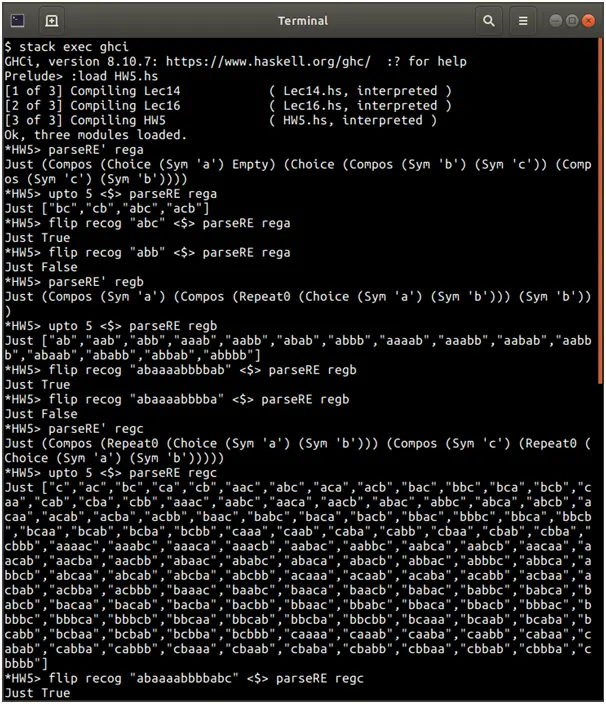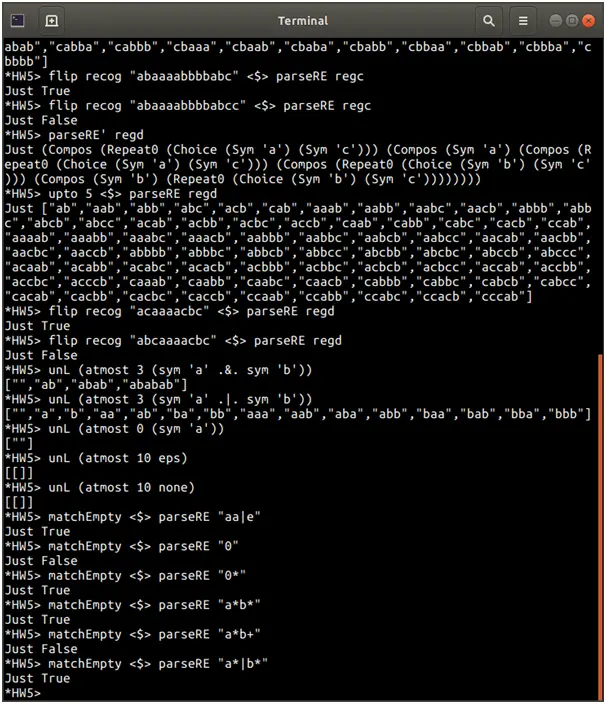Instructions
Objective
Write a Haskell assignment program that allows users to simulate regular expressions.
Requirements and Specifications
- Define string containing regular expressions for the following languages over the alphabet {a,b,c}.
-- A. The language {"bc","cb","abc","acb"}
-- B. Strings that begin with 'a' and end with 'b' and do not contain 'c'
-- C. Strings in which 'c' occurs exactly once
-- D. Strings containing at least one 'a' and at least one 'b', where all 'a's occur earlier than any 'b'.
- Define atmost such that atmost n r means r repeated up to n times. If n is 0 (or negative), atmost n r will be equivalent to eps (that is, repeating r zero times).
- Define matchEmpty, which determines whether the language for a regular expression.
Screenshots of output


Source Code
{-# LANGUAGE TypeFamilies #-}
module HW5 where
-- Download Lec14.hs and Lec16.hs from Canvas and place them in the same directory as
-- HW5.hs
import Control.Applicative ((<|>))
import Lec14 (Parser, parse, pSym)
import Lec16
pLetter :: Parser Char Char
pLetter
= pSym 'a'
<|> pSym 'b'
<|> pSym 'c'
parseRE :: (Regular a, Symbol a ~ Char) => String -> Maybe a
parseRE = parse (pRE pLetter)
parseRE' :: String -> Maybe (RE Char)
parseRE' = parseRE
-- *****
-- 1. Define string containing regular expressions for the following languages over the
-- alphabet {a,b,c}.
--
-- Example. Strings containing 'a' two or more times
example = "aa+"
-- Note that you can use parseRE, recog, and upto to test your expressions.
--
-- *HW5> parseRE' example
-- Just (Compos (Sym 'a') (Repeat1 (Sym 'a')))
-- *HW5> upto 5 <$> parseRE example
-- Just ["aa","aaa","aaaa","aaaaa"]
-- *HW5> flip recog "aaa" <$> parseRE example
-- Just True
-- *HW5> flip recog "aaab" <$> parseRE example
-- Just False
-- A. The language {"bc","cb","abc","acb"}
rega = "(a|e)(bc|cb)"
-- B. Strings that begin with 'a' and end with 'b' and do not contain 'c'
regb = "a(a|b)*b"
-- C. Strings in which 'c' occurs exactly once
regc = "(a|b)*c(a|b)*"
-- D. Strings containing at least one 'a' and at least one 'b', where all 'a's occur
-- earlier than any 'b'.
regd = "(a|c)*a(a|c)*(b|c)*b(b|c)*"
-- *****
-- 2. Define atmost such that atmost n r means r repeated up to n times. If n is 0
-- (or negative), atmost n r will be equivalent to eps (that is, repeating r zero
-- times).
--
-- *HW5> unL (atmost 3 (sym 'a' .&. sym 'b'))
-- ["","ab","abab","ababab"]
-- *HW5> unL (atmost 3 (sym 'a' .|. sym 'b'))
-- ["","a","b","aa","ab","ba","bb","aaa","aab","aba","abb","baa","bab","bba","bbb"]
-- *HW5> unL (atmost 0 (sym 'a'))
-- [""]
-- *HW5> unL (atmost 10 eps)
-- [[]]
-- *HW5> unL (atmost 10 none)
-- [[]]
atmost :: (Regular a) => Integer -> a -> a
atmost n f = if n <= 0 then eps else eps .|. (f .&. atmost (n-1) f)
-- *****
-- 3. Define matchEmpty, which determines whether the language for a regular expression
-- includes the empty string.
--
-- *HW5> matchEmpty <$> parseRE "aa|e"
-- Just True
-- *HW5> matchEmpty <$> parseRE "0"
-- Just False
-- *HW5> matchEmpty <$> parseRE "0*"
-- Just True
-- *HW5> matchEmpty <$> parseRE "a*b*"
-- Just True
-- *HW5> matchEmpty <$> parseRE "a*b*"
-- Just True
-- *HW5> matchEmpty <$> parseRE "a*b+"
-- Just False
matchEmpty :: RE symbol -> Bool
matchEmpty (Sym _) = False
matchEmpty Empty = True
matchEmpty Never = False
matchEmpty (Repeat0 _) = True
matchEmpty (Repeat1 _) = False
matchEmpty (Compos a b) = matchEmpty a && matchEmpty b
matchEmpty (Choice a b) = matchEmpty a || matchEmpty b
Related Samples
Explore our free Haskell assignment samples to gain insights into functional programming concepts, recursive functions, and type systems. These samples showcase our expertise in Haskell programming, helping you understand its applications and complexities.
Haskell
Haskell
Haskell
Haskell
Haskell
Haskell
Haskell
Haskell
Haskell
Haskell
Haskell
Haskell
Haskell
Haskell
Haskell
Haskell
Haskell
Haskell
Haskell
Haskell
